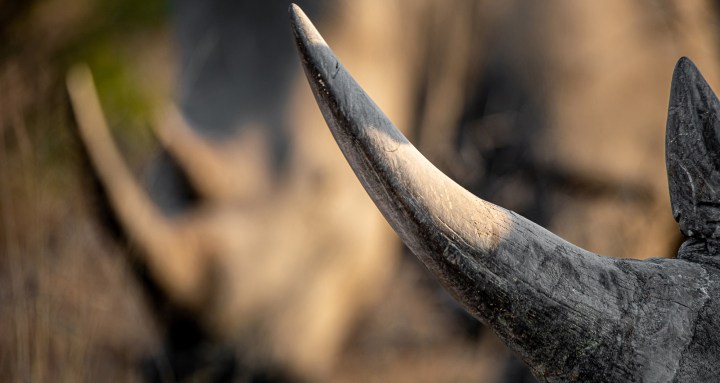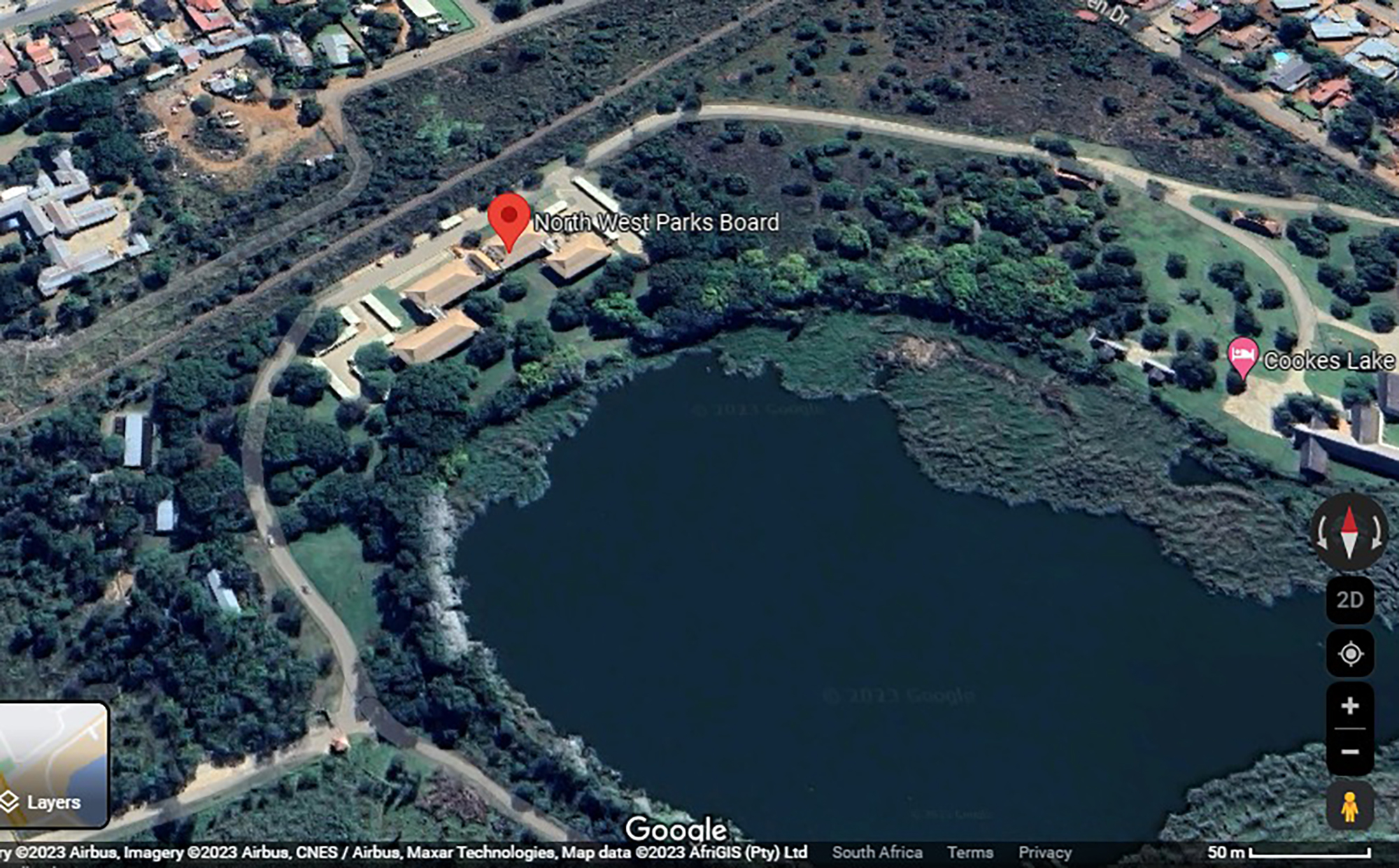STOCKPILE HIT
‘Kick in the gut’ – thieves escape with 51 rhino horns from North West Parks Board HQ

Conservationists are raising serious questions about crime scene protocols – and the sense in stockpiling rhino horn – after a report claimed the police took eight hours to respond to a burglary at the North West Parks Board on Monday.
In what is being described as a well-planned heist executed with military precision, thieves broke into the Heritage House headquarters of the North West Parks Board in the early hours of Monday and stole 51 rhino horns worth millions of rands on the Asian black market.
Police confirmed only that a ‘business burglary’ case had been opened and was under investigation.
Confirming the theft of the horns following circulation of an anonymous report, Pieter Nel, the North West Parks Board’s acting chief conservation officer, described the incident as being “like a kick in the gut”.
Heritage House is on the shores of Cookes Lake, a five-minute drive from the centre of Mahikeng.
An anonymous report seen by Daily Maverick claims it took almost eight hours for the police to arrive after they were summoned. “Unfortunately SAPS took almost 8 hours to arrive at the scene, after the CEO had to phone Genl. Asaneng to get a response. So much for the golden hour. This is a huge setback for NWP,” reads the report.

Google maps screenshot of North West Parks Board building next to Cookes Lake. Photo: Google Maps
Methodical
According to the report, thieves broke into the main vault at the agency’s security-patrolled offices between 1.30am and 2.15am on Monday. They allegedly broke into the resource security offices on the first floor by cutting wires on the distribution board, disabling the alarms and removing security cameras.

Seized rhino horns on display at the Department of Wildlife and National Parks headquarters in Kuala Lumpur on 20 August 2018. (Photo: EPA-EFE / Fazry Ismail)
Camera footage allegedly shows two persons with their faces covered. Working methodically, the thieves reportedly got into the main vault by first removing a small safe from its wall fixture in the resource security manager’s office and breaking it open to remove the vault keys.
Read more in Daily Maverick: Alleged rhino poaching kingpin gunned down near kruger park
The thieves then walked down a flight of stairs, broke open office doors and security doors in the passages, from where they accessed the main vault. They left the premises carrying the horns in large woven polypropylene packaging bags through a back gate, the locks of which had also been cut.
Speaking to Daily Maverick from Pilanesberg, Nel confirmed that of the 51 horns, 14 were very large specimens from mortalities, with the balance made up of smaller horns and trimmed pieces from dehorning operations at North West Parks.
“The robbery was discovered by one of our investigators when he arrived at the offices. Apparently he responded to an alarm, and when he saw the scene he contacted the resource security manager.
“I was at Pilanesberg and only received a verbal telephonic report, so there is quite a lot that was mentioned that we still need to investigate… like where were the security guards stationed, what are the details their patrols entailed, and what their records indicated. I am waiting for the full report,” he said.
He added that there had been plans in place to move the horns to a safer location before the robbery, and estimated the total weight at “somewhere between 70kg and 90kg”.
If the horn was systematically destroyed then criminals wouldn’t have access to stockpiles, putting people at risk…
Several state conservation agencies, such as SANParks and Ezemvelo KZN Wildlife, have been storing and stockpiling rhino horns from natural deaths and poaching for decades, in the hope of selling them to fund conservation work if the CITES ban is ever lifted. Some nations, including Kenya, have opted to burn/destroy rhino horn stockpiles, but most southern African nations have not. The latter include South Africa, Namibia and Zimbabwe.
CITES (the Convention on International Trade in Endangered Species of Wild Fauna and Flora) is an international agreement between governments. Its aim is to ensure that international trade in specimens of wild animals and plants does not threaten the survival of the species.
Read more in Daily Maverick: Hefty sentences for rhino poachers after new wildlife trafficking strategy starts to bite
Attempts to reach General Gopolang Patrick Asaneng, the North West deputy police commissioner, were unsuccessful.
Contacted by Daily Maverick to explain the SAPS’ alleged tardiness in responding to a business robbery, North West police spokesperson Brigadier Sabata Mokgwabone replied: “We are currently in contact with the station regarding your query and will respond in detail as soon as we get the feedback. However, we can confirm that a case of business robbery has been opened and investigations thereof are under way.”
Crime scene questions
Mary Rice, director at the international Environmental Investigation Agency, questioned why it allegedly took so long for the police to get to the crime scene, and if crime scene management protocols were strictly adhered to.
“It is widely acknowledged that sophisticated organised criminal networks are involved in the international trafficking of wildlife and here is yet another example of how these criminals run rings around the authorities and exploit corrupt individuals who are often the mandated guardians of the target.

Rhinos on a farm in Klerksdorp on 8 September 2016. (Photo: Gallo Images / Rapport / Conrad Bornman)
“Why continue to stockpile rhino horn when its sale is internationally banned, and at what cost? This perpetuates the notion that at some point the markets will reopen, and stimulates illegal trade and the vicious cycle that South Africa finds itself in with regard to fighting the organised gangs exploiting their rhino and presenting real risks to life for those at the front line.
“If the horn was systematically destroyed then criminals wouldn’t have access to stockpiles, putting people at risk and putting money into what is effectively a black hole to store the horn securely – or not, when corruption and organised criminal syndicates are added to the mix and perpetuating an illegal market thousands of miles away,” Rice said.
This is not the first time vast quantities of rhino horn have been stolen from what are supposed to be well-guarded and secure government-run premises.
In 2014, thieves broke into the Mpumalanga Tourism and Parks Agency HQ in Nelspruit. Using heavy machinery, they broke into the safe and stole 112 pieces of rhino horn.
That crime has never been solved. DM





















inside job with the help of corrupt police
Inside job. Government anti-poaching collects it then arranges to “steal” it, or do with what DAFF does with the perlemoen confiscations – sells it to China to “offset” anti- poaching innitiatives.
Its a top-rank scam.
Reporting anything less than that is an obfuscation and cover-up.
If our conservationists are in favour of the animal parts trade ban then storing ‘in case’ the ban is removed seems hypocritical albeit financially rewarding (if not stolen).
Most of our conservationists are not in favour of the ban. South Africa would like to lift it. But countries motivated by rich which northern hemisphere activists who don’t have rhinos nor the responsibility of maintaining or conserving them, get to vote on how we manage them.
Quite. The ban is maintained in the most part by people who have no skin in the game other than a career as an “activist”. We’ve had this conversation before, I’m afraid. Maybe us Southern African nations should withdraw from CITES. However, that would put us in the company of a few rather unpleasant countries!
The big hypocrisy in the storing of rhino horn is that it plays into the myth that it has some value other than the very spurious financial value placed on it by those who stand to benefit from this (medical charlatans, the poachers, and those who want to benefit from an ‘open market’ in rhino horn – yes and tiger/lion bones, and bear bile etc.). In other words it is like saying that, yes there is some medicinal value in these things and putting a price on them makes sense, so we will be ready to capitalise on this when the market is opened up. The burning of rhino horn is intended to send the more honest message that there is no real (read medicinal) value in these things just an artificially created financial value, and any real conservationist cannot subscribe to this nonsense. And no, it is not just northern conservationists with no ‘skin in the game’, but people who deplore the false monetary valuation of wildlife to the detriment of the recognition of its real and deeper values to us.
While I don’t claim to understand the nuances of this topic – what ypu say sounds sensible and ethically sound.
Is this just another of those ‘sponsored’ from high up activities like cash in transit heists, copper cable theft, coal supply mafias, construction mafias?
Correct inside job,the humpty dumpy party can’t stop eating money,they will do anything for it,stuff the country and its citizens
The only way forward is to lift the ban on the sale of rhino horn. Farmers would soon supply the market demands, making poaching less attractive.
Simple solution : saturate harvested and confiscate horns in a toxic chemical. It might do wonders for demand …
Lie Detector tests for all the staff, most senior down to gardeners!
Inside job for sure.
We should be destroying this horn as the Kenyans have done with their elephant tusks.
The value of these horns makes it exceedingly easy for government employees to be coerced by criminal syndicates into participating in these crimes.
I don’t get it. Why continue to stockpile rhino horn? Either flood the market and kill demand by selling off stockpiles or systematically destroy it. I’m no expert, but we need to come up with a solution that drives the demand down and doesn’t put people at risk. As stated we are “putting money into what is effectively a black hole to store the horn securely”.